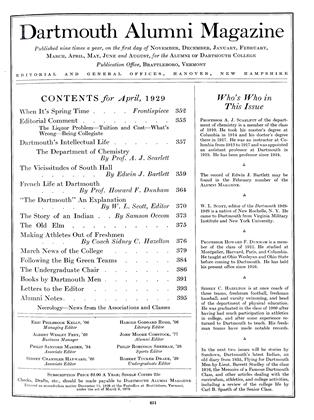When the new directorate of the news board of The Dartmouth went into office, John French, Jr. '30 succeeded W. L. Scott '29, R. It. Bottome '30 took the place of J. E. Cavanagh '29 and A. I. Dickerson '30 succeeded R. T. Drake '29. The new directorate startled its readers on its first day in office by announcing with blazing headlines that "DARTMOUTH MEETS STANFORD IN 1930." The opening editoral was less sensational with its reiteration of old truths. An editorial in its column on the third day of the directorate runs as follows:
"If the College professes a liberal doctrine, the very freedom it permits its students allows them to lapse back into the cast steel mores of the sidewalk. Merely because Middle Mass has seven hours of leisure a day doesn't mean that you can obtain a perfect roll call in the library at any time during the afternoon. If anyone was interested, you would find them at the movies, writing home, clustered about a red dog game, showering. One or two that had hour examinations would be boning. There would be very little reading that was not rigidly required by the curriculum. There would be even less discussion of the high-spun thoughts that have made the most practical men believe in the ultimate perfectibility of the human race.
"If the College happens to possess a reactionary creed, one that believes, by God, that Latin and Greek and the ferrule are the symbols of intelligence, it doesn't really matter very much. It is only a case of intellectual stalemate in a pseudo-classical atmosphere.
"If the liberal theory is ever to mean anything more than a dream of philosophers, it must be administered with an iron hand that is wise enough to give candy at recess."
It takes a mental gymnast to make anything out of that last sentence, but if it does mean anything it rather looks as though the editor's opinion of all the talk heard in these parts about "The Liberal College" is that it was wasted breath.
Another editorial by the new editor expresses the opinion that half-education and education for the wrong things may make the college men of today socially dangerous, partially because the colleges are getting America's best men. Quoted in part this is the editorial:
"The average owner of the sheepskin steps out to battle in the school-of-hard-knocks confident that he has become educated. He has passed the stipulated requirement of four year's education with a 1.8 average or slightly better; he was taught a pile of stuff that he had never heard of before. That ought to be getting educated. Besides, when one is working, one can't fool around reading Chaucer, The Principles of Economics and whatnot. All that is past. Living, not studying is ahead.
"But colleges don't profess to be finishing schools. When they graduate several hundred every June it isn't admitted by them that they are turning out a fully completed product of a wise man. College is simply a stimulus, an opportunity to enlarge one's mental horizon. In other words, it is a poke from the rear and a rub down after the first heat. The finals have to be run by the individual after his capacity for achieving satisfactions from a mental standpoint has been accelerated and augmented in varying degree by the college from which he is graduated.
"That this important fact is overlooked by the majority of college men is becoming more and more noticeable. Since the universities of today set the highest standard in the country and produce the foremost men of the generation of tomorrow, something should be done to correct the impression that graduates can safely put down their books and devote themselves to the pursuit of financial success.
"From the point of view of knowledge they will merely be dangerous."
It is interesting to note in this editorial the belief of the editor that the colleges are getting good men. The senior editor just retired, W. L. Scott, was of another opinion. He used to point out frequently the enlarged size of present day universities and what seemed to him the inevitable fall in quality of undergraduates.
 View Full Issue
View Full Issue
More From This Issue
-
 Class Notes
Class NotesCLASS OF 1923
April 1929 By Truman T. Metzel, "Charlie Chadbourne" -
 Article
ArticleThe Vicissitudes of South Hall
April 1929 By Edwin J. Bartlett -
 Lettter from the Editor
Lettter from the EditorEditorial Comment
April 1929 -
 Article
ArticleFrench Life at Dartmouth
April 1929 By Howard F. Dunham -
 Class Notes
Class NotesCLASS OF 1899
April 1929 By Louis P. Benezet -
 Article
Article"The Dartmouth," An Explanation
April 1929 By W. L. Scott, Editor
Robert T. Drake
-
 Article
ArticleHanover's Town Meeting
APRIL 1929 By Robert T. Drake -
 Article
ArticleDouble Trouble
APRIL 1929 By Robert T. Drake -
 Article
ArticleSenior Ascent of Mt. Washington
APRIL 1929 By Robert T. Drake -
 Article
ArticleCurrent Events Contest
APRIL 1929 By Robert T. Drake -
 Article
ArticleThe Dart
APRIL 1929 By Robert T. Drake -
 Article
ArticleClass Election Results
APRIL 1929 By Robert T. Drake







